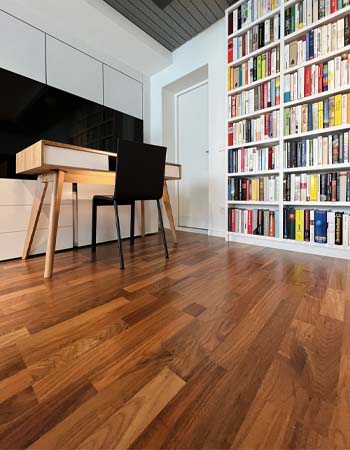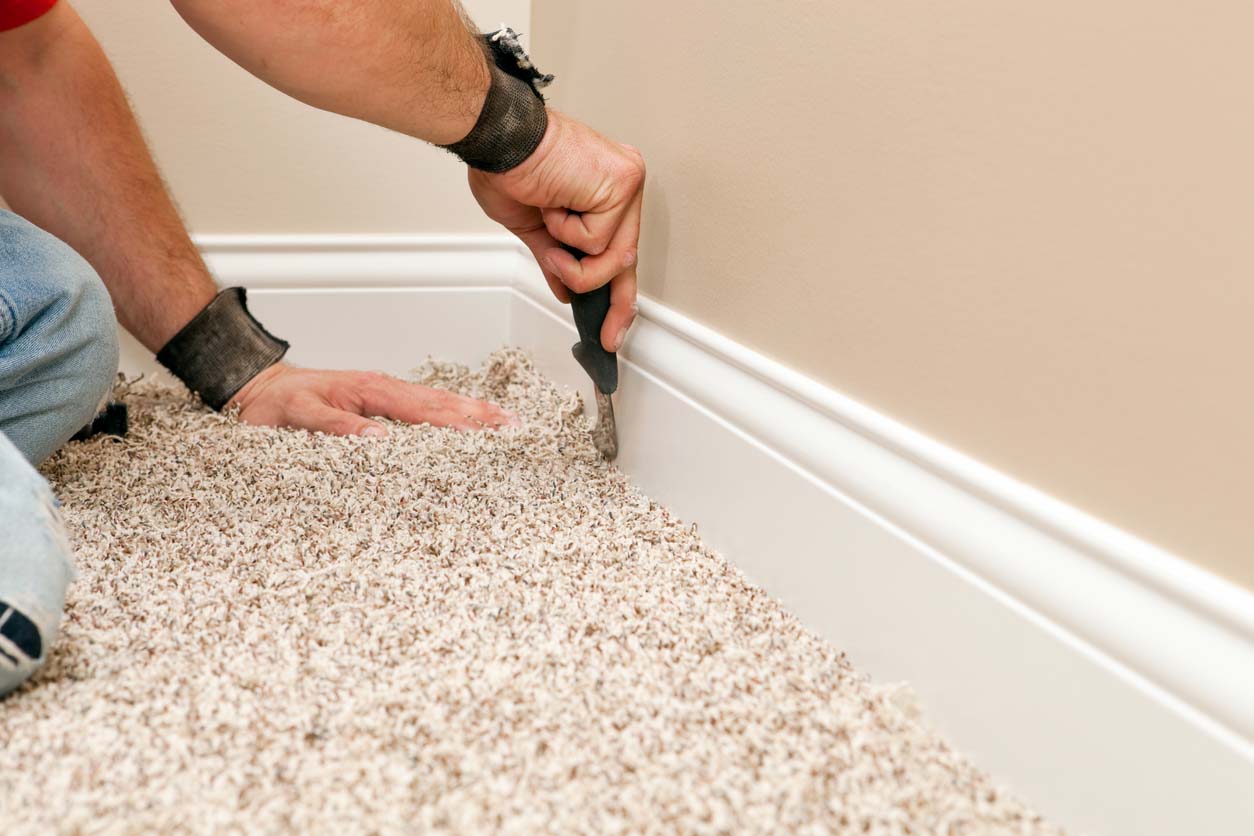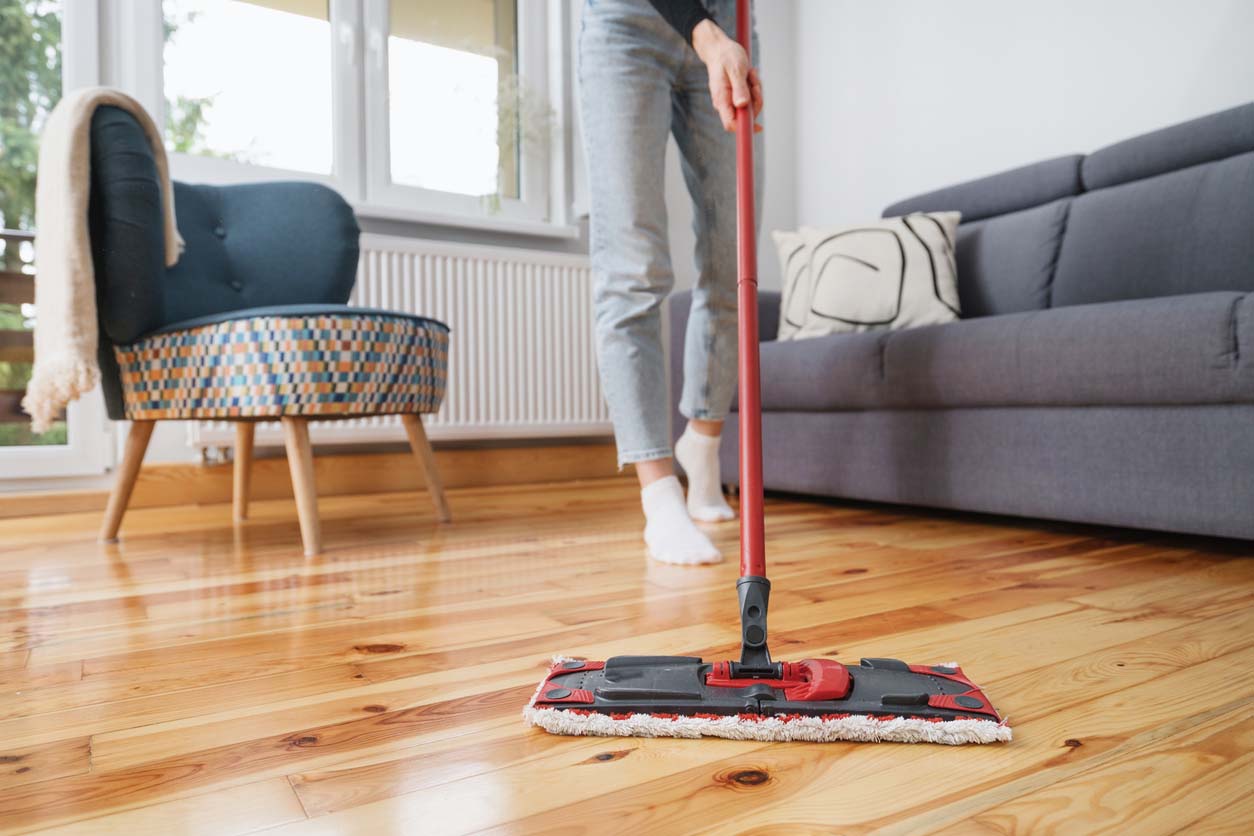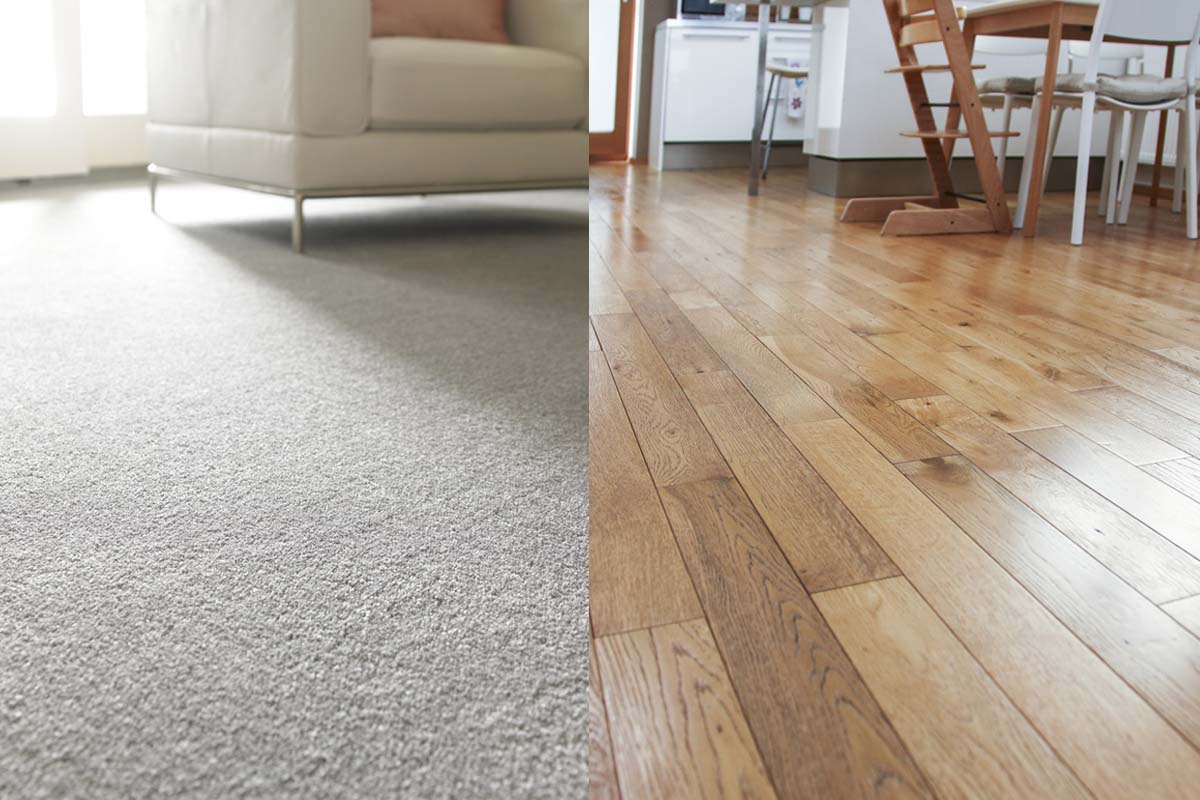We may earn revenue from the products available on this page and participate in affiliate programs. Learn More ›
When homeowners consider a flooring upgrade, carpet vs. hardwood cost is a frequent comparison. Each option has its own set of advantages and drawbacks, and the overall installation cost plays an important role in the decision-making process. This guide will examine the differences between carpet and hardwood flooring so homeowners can decide on the best choice for their homes.

Carpet, hardwood, tile, vinyl, and laminate flooring.
Bob Vila has partnered with Empire Today® to help you easily get beautiful new floors at a great price.
Free In-Home Estimates
For many homeowners, hardwood flooring is often seen as an elegant and durable choice, but it tends to come with a higher up-front cost compared to carpet. Hardwood flooring cost varies based on factors such as the type of hardwood, the grade of the wood, and the local pricing trends. Solid hardwood flooring options tend to be more expensive due to the high-quality composition and natural beauty of the material.
Hardwood flooring installation can be more intricate and time-consuming than carpet installation. It involves securing individual pieces of hardwood to the subfloor, which requires hiring one of the best hardwood flooring installation companies or a top local contractor, making the labor costs higher than for carpet installation. One of the notable cost-saving aspects of hardwood flooring lies in its longevity and easy maintenance. Regular cleaning and occasional refinishing can extend the life of hardwood floors. Learning how to clean hardwood floors properly can help homeowners mitigate the need for replacement. Over time, hardwood floors may show signs of wear and tear, and refinishing allows homeowners to restore the flooring’s original luster and appearance, which is more cost-effective than replacing the entire floor.
Carpet installation typically has lower up-front costs compared to hardwood flooring. Homeowners will also want to take the long-term expenses and maintenance related to carpeting into consideration when deciding on flooring material. Carpet installation is generally less complex and time-consuming, often resulting in lower labor costs. The materials used in the installation process are also more affordable than hardwood materials. While carpet replacement cost is typically lower than reinstalling hardwood flooring, carpets have a shorter lifespan. The cost of frequent replacement can add up over time, ultimately offsetting the initial savings in installation.
It’s a good idea for homeowners to take into account their design preferences, lifestyle, and priorities along with financial considerations when making a decision regarding carpet vs. hardwood cost. By evaluating important factors such as installation, ongoing maintenance requirements, and individual materials, they can make an informed choice that works with their budget and desired look for the space.
1. Carpet has a lower up-front cost than hardwood floors, making it ideal for homeowners with a tight budget.

Homeowners with budget constraints often find carpet to be a more appealing flooring choice than hardwood floors because of its lower installation cost. This financial advantage allows the living space to be transformed without breaking the bank. Carpet is the more affordable option because of the relatively lower material costs and the easier installation process. With a wide range of carpet options available, homeowners can choose the type of carpet that aligns with their budget while getting the look they want for their homes.
While the initial cost of carpet installation might be lower, it’s important for homeowners to consider the long-term costs. While more cost-effective at the outset, carpets come with a trade-off in terms of durability and maintenance. They are susceptible to wear and tear, staining, and accumulation of allergens and dust. These factors can result in the need for more frequent replacement, which involves an additional cost to remove the carpet by hiring one of the best carpet removal services. These costs can offset the savings achieved during the initial installation. In contrast, hardwood floors may have a higher installation cost, but their durability and longevity often result in reduced overall expenses over the years.
The decision for homeowners to choose between carpet and hardwood flooring goes beyond just the initial up-front cost. It involves a balance between immediate budget considerations and the long-term value that each flooring option brings to a home.
2. However, depending on material, homeowners may find that carpet and hardwood flooring costs can fall within a similar range.
The cost comparison between carpet and hardwood flooring can reveal surprising similarities, especially when homeowners are considering various material options. While carpet is often associated with lower up-front costs, it’s worth noting that hardwood flooring costs can span a broad spectrum, accommodating many budgets. The average price of carpeting ranges from $2 to $7 per square foot, although it’s common to see prices that run from $1 to $20 per square foot, and labor is an additional $0.50 to $1 per square foot. The overall price of carpet installation depends on the room size and shape; the quality, style, and material of the carpeting; and the pile, cut, and loop of the material. Wool carpet can cost from $4.50 to $10 per square foot, and berber carpet can range from $4 to $20 per square foot. The cost of higher-quality carpeting can be much more expensive than lower-priced hardwood flooring, such as eco-friendly bamboo flooring, which runs between $2 and $4 per square foot.
The overall cost of carpet installation can vary based on factors such as the type of carpet fiber, pile height, and design complexity. Some high-end carpet materials, intricate patterns, or specialized designs can lead to higher material costs, narrowing the gap between carpet and hardwood flooring costs. Hiring one of the best carpet installation companies can ensure the carpet is installed properly.

Carpet, hardwood, tile, vinyl, and laminate flooring.
Bob Vila has partnered with Empire Today® to help you easily get beautiful new floors at a great price.
Free In-Home Estimates
When exploring hardwood flooring options, homeowners will encounter an array of hardwood species, each with its own cost considerations. While solid hardwood flooring is more expensive, engineered hardwood or certain types of softwoods can provide a more budget-friendly alternative. Installing hardwood flooring typically costs between $2,481 and $7,026, with homeowners spending an average of $4,721. The overall cost depends on the type of wood, the size of the room, the grade and width of the boards, the color and grain of the wood, and local labor prices.
The installation process and associated labor costs also contribute to the overall expense. Carpet installation is typically less labor-intensive, which leads to savings in terms of installation costs. Hardwood floor installation may involve more intricate steps, such as preparing the subfloor, installing moisture barriers, and precisely placing individual hardwood pieces, which will result in higher labor costs.
3. Hardwood may be more expensive to purchase and install, but it requires less maintenance and is more durable, meaning it costs less in the long run.
While the initial costs of purchasing and installing hardwood flooring might be higher compared to the costs associated with carpet, the long-term costs related to carpet can be significant. Hardwood’s more expensive investment is outweighed by its durability and minimal maintenance requirements, making it a cost-effective choice for many homeowners. The initial expenses associated with hardwood flooring may deter some homeowners who want a more budget-friendly option, but it’s worth it for many when they consider the long-term value.
Hardwood flooring boasts a remarkable ability to withstand the wear and tear of daily life. Unlike carpet, which can show signs of deterioration over time due to foot traffic, hardwood floors are much more durable. Regular sweeping and occasional mopping are generally sufficient to maintain the attractive appearance of hardwood floors, while carpets require more rigorous cleaning efforts to eliminate stains, odors, and allergens. This additional maintenance can add up in both time and money over the years. Over time, hardwood flooring may show signs of aging. Rather than homeowners needing to pay for a complete replacement, the option to refinish hardwood floors by hiring one of the best hardwood floor refinishing companies can restore the original look and extend the life of the wood.

4. Hardwood can also be refinished to extend its life—but that comes at an additional cost.
The ability to refinish hardwood floors is a valuable option that contributes to the longevity of the material. Over time, hardwood floors can develop surface imperfections, scratches, and signs of wear. Refinishing involves sanding down the top layer of the hardwood and applying a new finish, which effectively rejuvenates the floor’s appearance, restoring its original look. While refinishing extends the life of the floor and can delay the need for a full replacement, homeowners can expect to pay between $1,081 and $2,553 for the cost of refinishing hardwood floors. The overall cost depends on the size of the area to be refinished, the type of finish applied, and local labor pricing. Refinishing hardwood floors is an investment that prolongs the life of the flooring and restores the original look.
5. Carpets will need to be replaced every 5 to 15 years, but homeowners can expect to reach the top end of that range if they pay to properly clean and maintain their carpet.
Carpet comes with its own set of maintenance considerations that can significantly impact its lifespan and associated costs. While carpets typically have a shorter lifespan relative to hardwood floors, regular maintenance can extend their longevity. Carpets usually need to be replaced every 5 to 15 years due to factors like wear, staining, and fading. Carpet that’s in high-traffic areas or is exposed to various elements can result in the need for homeowners to pay for the cost of carpet repair or even a full replacement sooner rather than later. Properly maintaining carpets through regular cleaning and care can make a substantial difference in their lifespan. Regular vacuuming, prompt spot cleaning, and periodic cleaning—whether a homeowner hires one of the best carpet cleaning companies (or local contractors) or pays the cost to rent a carpet cleaner—can help mitigate the accumulation of dirt, allergens, and stains that contribute to premature wear. By adhering to these maintenance recommendations, homeowners have a better chance of reaching the top of the replacement range.

6. Hardwood floors can also increase a home’s value, providing even more cost savings when the homeowner wants to sell.
The financial benefits of hardwood flooring extend beyond its initial costs. Hardwood floors have the potential to enhance a home’s overall value, offering homeowners a substantial return on investment (ROI) when it comes time to sell their property. On average, the ROI for installing hardwood flooring is between 70 and 80 percent. Since hardwood floors are often associated with elegance, timeless beauty, and a sense of luxury, these attributes can significantly enhance a home’s aesthetic appeal, making it more attractive to potential buyers. The visual impact of hardwood flooring can create a positive first impression and set a higher perceived value for the entire property.
Hardwood flooring is a sought-after feature, and many home buyers actively seek out properties with hardwood floors due to their durability, ease of maintenance, and value. Homes with hardwood flooring often stand out in the market and can command higher prices compared with houses that have other types of flooring options.
7. Homeowners will need to determine which flooring option best fits their budget—both up front and over time—to decide whether to choose carpet or hardwood.
Ultimately, the decision between carpet and hardwood flooring hinges on a homeowner’s budget and their long-term goals. Careful consideration of up-front costs and ongoing maintenance implications over time is important when making an informed choice that will best suit their needs.
The initial costs of each material certainly play a role in the decision-making process. Homeowners with a tight budget might initially be drawn to the lower cost of carpet installation, but those who can make a larger investment might find that the lasting value and appeal of hardwood flooring justifies the expense. Looking beyond the initial investment, it’s recommended that homeowners weigh the long-term costs. Carpet, while more affordable initially, requires more frequent replacement, along with the costs of professional carpet cleaning and maintenance (or alternatively, using one of the best carpet cleaner rental services). This accumulation of costs over time can negate the initial budget advantage of carpet installation.
A homeowner’s lifestyle, preferences, and priorities are also important factors in the decision-making process. Those seeking a luxurious, elegant appearance that enhances their home’s value might be more inclined toward installing hardwood or a high-end carpet, while those with immediate budget constraints might opt for the cost of bamboo flooring or cheaper carpeting choices.
In the end, the choice between carpet and hardwood flooring is not merely about choosing one over the other. It’s a comprehensive decision that takes into account a homeowner’s budget, aesthetic preferences, maintenance commitment, and long-term plans. By carefully evaluating the short-term affordability and long-term value of both options, homeowners can make a well-informed decision that enhances their living space in the best possible way.
Sources: HomeAdvisor


